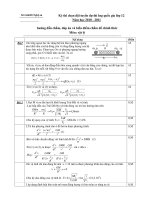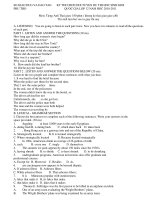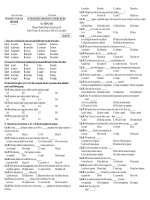ĐỀ THI KSCL ÔN THI THPT QUỐC GIA LỚP 12 NĂM HỌC 2017 2018 ĐỀ THI MÔN: TIẾNG ANH TRƯỜNG THPT YÊN LẠC
Bạn đang xem bản rút gọn của tài liệu. Xem và tải ngay bản đầy đủ của tài liệu tại đây (67.71 KB, 4 trang )
SỞ GD-ĐT VĨNH PHÚC
TRƯỜNG THPT YÊN LẠC
Đề thi có 04 trang
ĐỀ THI KSCL ÔN THI THPT QUỐC GIA LỚP 12 - LẦN 1
NĂM HỌC 2017 - 2018
ĐỀ THI MÔN: TIẾNG ANH
Thời gian làm bài 60 phút; Không kể thời gian giao đề./.
MÃ ĐỀ THI: 212
Họ tên thí sinh .................................................................................Số báo danh: .....................
Read the passage and mark A, B, C, or D to indicate the correct answer to each of the blanks.
Years ago there were many social rules and etiquette procedures involving introductions. Some
formal introductions between two people were (1)__________ by words by the third party. A person had to
be very careful to weigh the importance of social class or status, age, and gender when deciding
(2)__________ person should be presented or introduced to the other person first. However, times have
changed, and most of the social rules about introducing older people to younger ones, women to men, and
those in higher positions to those in lower positions have changed, too. Many people now feel much more
(3)__________ about making introductions.
In most situations, handshaking is optional, but these days it is more often done than not,
especially in formal social or business settings. It is very common for one person (or both) to extend a hand
when meeting someone. If you are in this situation, and you are offered a hand to shake, you should grasp it
firmly and shake it briefly. People often tend to make some (4)__________ about someone (5)__________
their handshakes, so make sure yours is not too weak, not too hard and not too long-lasting. It should be
firm and brief.
Câu 1:
A. done
B. taken
C. made
D. served
Câu 2:
A. whose
B. that
C. which
D. who
Câu 3:
A. nervous
B. relaxed
C. comfortable
D. anxious
Câu 4:
A. introductions
B. arguments
C. judgments
D. remarks
Câu 5:
A. regardless
B. according
C. on account
D. depending
Mark the letter A, B, C or D on your answer sheet to indicate the word(s) OPPOSITE in meaning to
the underlined word(s) in each of the following questions.
Câu 6: He had never experienced such discourtesy towards the president as it occurred at the annual
meeting in May.
A. encouragement
B. measurement
C. politeness
D. rudeness
Câu 7: When he passes the entrance exam, his parents will be walking on the air.
A. feeling extremely unhappy
B. extremely happy
C. feeling extremely airy
D. extremely light
Mark the letter A, B, C or D on your answer sheet to indicate the word whose underlined part differs
from the other three in pronunciation in each of the following questions.
Câu 8:
A. kites
B. likes
C. sites
D. mimes
Câu 9:
A. retouch
B. counter
C. doubt
D. boundary
Mark the letter A, B, C or D on your answer sheet to indicate the word that differs from the other
three in the position of primary stress in each of the following questions.
Câu 10: A. sacrifice
B. determine
C. supportive
D. contractual
Câu 11: A. desert
B. demand
C. decide
D. defend
Mark the letter A, B, C or D in your answer sheet to indicate the underlined part that needs
correction in each of the following questions.
Câu 12: We don’t know why Mary is upset, and she didn’t speak to us for ages.
A. ages
B. why
C. upset
D. didn’t speak
Câu 13: One of the majority causes of tides is the gravitational attraction of the moon.
A. majority
B. gravitational
C. tides
D. attraction
Câu 14: They asked me how long did it take to get to Paris by train.
A. how long
B. did it take
C. get to
D. by train
Read the following passage and mark the letter A, B, C or D on your answer sheet to indicate the
correct answer to each of the questions.
Although speech is generally accepted as the most advanced form of communication, there are
many ways of communicating without using words. In every known culture, signals, signs, symbols, and
Trang 1/4 - Mã đề thi 212
gestures are commonly utilized as instruments of communication. There is a great deal of agreement among
communication scientists as to what each of these methods is and how each differs from the others. For
instance, the basic function of any signal is to impinge upon the environment in such a way that it attracts
attention, as, for example, the dots and dashes that can be applied in a telegraph circuit. Coded to refer to
speech, the potential for communication through these dots and dashes-short and long intervals as the
circuit is broken-is very great. Less adaptable to the codification of words, signs also contain agreed upon
meaning; that is, they convey information in and of themselves. Two examples are the hexagonal red sign
that conveys the meaning of stop, and the red and white swirled pole outside a shop that communicates the
meaning of barber.
Symbols are more difficult to describe than either signals or signs because of their intricate
relationship with the receiver’s culture perceptions. In some cultures, applauding in a theater provides
performers with an auditory symbol of approval. In other cultures, if done in unison, applauding can be a
symbol of the audience’s discontent with the performance. Gestures such as weaving and handshaking also
communicate certain culture messages.
Although signals, signs, symbols, and gestures are very useful, they also have a major disadvantage
in communication. They usually do not allow ideas to be shared without the sender being directly adjacent
to the receiver. Without an exchange of ideas, interaction comes to a halt. As a result, means of
communication intended to be used across long distances and extended periods must be based upon speech.
To radio, television, and the telephone, one must add fax, paging systems, electronic mail, and the internet,
and no one doubts but that there are more means of communication on the horizon.
Câu 15: Applauding was cited as an example of__________.
A. a gesture
B. a sign
C. a signal
D. a symbol
Câu 16: What does the author say about speech?
A. It is dependent upon the advances made by inventors.
B. It is the most advanced form of communication.
C. It is necessary for communication to occur.
D. It is the only true form of communication.
Câu 17: The word “themselves” in the first paragraph refers to__________.
A. signs
B. words
C. intervals
D. information
Câu 18: Why were the telephone, radio, and TV invented?
A. People were unable to understand signs, symbols, and signals.
B. People wanted to communication across long distance.
C. People believed that signs, signals, and symbols were obsolete.
D. People wanted new forms of entertainment.
Câu 19: Which of the following would be the best title for the passage?
A. Sign and Signals
B. Speech
C. Gestures
D. Communication
Câu 20: The word “potential” in the first paragraph could best be replaced by_____________.
A. range
B. organization
C. advantage
D. possibility
Câu 21: The word “it” in the first paragraph refers to__________.
A. environment
B. signal
C. way
D. function
Mark the letter A, B, C or D on your answer sheet to indicate the correct answer to each of the
following question.
Câu 22: It’s my wish that he ___________here at this room at 5p.m tomorrow.
A. is
B. is going to be
C. be
D. will be
Câu 23: The rise in energy___________ has led to a reduction of fossil fuels that the world must use.
A. redundancy
B. efficiency
C. consumption
D. suitability
Câu 24: The average ___________pays 50 cents a day in water consumption.
A. household
B. housing
C. housemate
D. housework
Câu 25: They said they had come back___________.
A. the following day
B. the next day
C. the previous day
D. the day after tomorrow
Câu 26: She said that she___________ participating in that event.
A. would be going to
B. was going to
C. would be interested D. would be interesting
Câu 27: David: Tom is very tired last night, wasn’t he?
Mary: Yes, he felt very tired but he________ until his guests______, then he ________ a rest.
Trang 2/4 - Mã đề thi 212
A. waited – left – would take
B. was waiting – left – took
C. had been waiting – left – took
D. waited – had left – took
Câu 28: Our teacher gave us___________ problem to solve.
A. a very impossible
B. an extremely impossible
C. a quite impossible
D. an absolutely impossible
Câu 29: The young American are usually___________ with physical attractiveness when choosing a wife
or a husband.
A. interested
B. critical
C. conscious
D. concerned
Câu 30: ___________ marriages, which are usually decided by the parents, are usually seen in Indian and
African cultures.
A. Open
B. Broken
C. Arranged
D. Romantic
Câu 31: There isn’t___________ airport near where I live. ___________nearest airport is 70 miles away.
A. an - A
B. the - A
C. an - The
D. the - The
Câu 32: John contributed fifty dollars, but he wishes he could contribute___________.
A. more fifty dollars
B. one other fifty dollars
C. the same amount also
D. another fifty
Câu 33: I get on very well with my roommate now; we never have any___________.
A. compliments
B. arguments
C. assistance
D. agreements
Mark the letter A, B, C, or D on your answer sheet to indicate the sentence that best combines of each
pair of sentences in the following questions.
Câu 34: You don’t try to work hard. You will fail in the exam.
A. Unless you don’t try to work hard, you will fail in the exam.
B. Unless you try to work hard, you will fail in the exam.
C. Unless you try to work hard, you won’t fail in the exam.
D. Unless do you try to work hard, you will fail in the exam.
Câu 35: He felt very tired. However, he was determined to continue to climb up the mountain.
A. As the result of his tiredness, he was determined to continue to climb up the mountain.
B. He felt so tired that he was determined to continue to climb up the mountain.
C. Feeling very tired, he was determined to continue to climb up the mountain.
D. Tired as he might feel, he was determined to continue to climb up the mountain.
Mark the letter A, B, C or D on your answer sheet to indicate the most suitable response to complete
each of the following exchanges.
Câu 36: Tom: “I’m sorry. I won’t be able to come.” Jerry: “____________________________”
A. Oh, that’s annoying! B. Well, never mind!
C. Sounds like fun!
D. Great!
Câu 37: Lan: “Well, cats are very good at catching mice around the house.” Mai: “___________”
A. Yes, I hope so.
B. No, dogs are very good, too.
C. You can say that again.
D. Nothing more to say.
Mark the letter A, B, C or D on your answer sheet to indicate the word(s) CLOSEST in meaning to
the underlined word(s) in each of the following questions.
Câu 38: Whenever problems come up, we discuss them frankly and find solutions quickly.
A. encounter
B. arrive
C. clean
D. happen
Câu 39: The emergence of supersonic travel opened new horizons for the military, tourism, and
commerce.
A. appearance
B. urgency
C. explosion
D. profitability
Mark the letter A, B, C or D on your answer sheet to indicate the sentence that is closest in meaning
to each of the following questions.
Câu 40: I haven’t enjoyed myself so much for years.
A. It has been years since I have enjoyed myself so much.
B. It’s years since I enjoyed myself so much.
C. It’s years since I have enjoyed myself so much.
D. It was years since I had enjoyed myself so much.
Câu 41: Without your help, I can’t be successful.
A. Thanks to your help, I have succeeded in doing it.
B. You are helpful, I like that.
C. Now I’m successful, I will help you.
D. Thank you for all the things you’ve done to me.
Câu 42: “Be careful: the steps are very slippery.” I said to him.
Trang 3/4 - Mã đề thi 212
A. I warned him to be careful as the steps were very slippery.
B. I suggested being careful as the steps were very slippery.
C. I threatened him to be careful as the steps were very slippery.
D. I told him be careful and the steps were very slippery.
Read the following passage and mark the letter A, B, C, or D on your answer sheet to indicate the
correct answer to each of the questions.
Benjamin Franklin is famous in the history of the United States because of his many and varied
accomplishments later in his life, as a brilliant diplomat, as a scientist, as an inventor, as a philosopher, and
as a public official. Early in his life, however, he was headed for a career as a printer. He was apprenticed at
the age of twelve in a print shop that belonged to his half-brother James. When faced with the unhappy
prospect of spending nine years in an intolerable situation, Benjamin devised a way to get out of his
contract as an apprentice printer in a rather unusual and creative way.
Benjamin’s half-brother James ran a weekly newspaper, the New-England Courant, and it was in
this paper that young Benjamin worked as an apprentice printer. Unbeknownst to his half- brother James,
who owned the paper, a very young Benjamin wrote a series of humorous letters to the paper. He did not
sign his own name to these letters. Instead, he used the pseudonym Mrs. Silence Dogwood. In these letters
he mocked the life around Boston. The letters amused the paper’s readers, but they did not have the same
effect on city officials.
As a result of the letters, city officials forbade James to publish his newspaper. James then decided
to continue printing the paper using Benjamin’s name rather his own; in order to do this, however, James
had to release Benjamin from his contract as an apprentice. After all, a newspaper could not be headed by
an apprentice printer. After James had released Benjamin from his apprenticeship, he was to discover that
Benjamin had written the letters that had caused so much trouble. He was angry that he had lost the right to
publish his paper because of Benjamin. On his part, Benjamin was delighted to have been released from his
contract as an apprentice.
Câu 43: It is NOT mentioned in the passage that Benjamin Franklin was recognized for his achievement
in________.
A. diplomacy
B. psychology
C. public service
D. science
Câu 44: How did young Benjamin feel about the idea of spending time as an apprentice printer?
A. He was discontented.
B. He was amused.
C. He was satisfied.
D. He was overjoyed.
Câu 45: The main idea of the passage is that Benjamin Franklin__________.
A. was involved in a prank at a New England newspaper.
B. dealt creatively with a problem early in his amazing career.
C. was known for his many and varied accomplishments.
D. worked at a newspaper owned by his half-brother James.
Câu 46: What eventually happened as a result of Benjamin’s letters?
A. Benjamin got out of his contract.
B. Benjamin became an apprentice printer.
C. James was given control of the paper.
D. James laughed at the joke.
Câu 47: The pronoun “they” in the last sentence of paragraph 2 refers to_________.
A. officials
B. letters
C. readers
D. citizens
Câu 48: The expression “unbeknownst to” in paragraph 2 could best be replaced by which of the
following?
A. Without consideration for
B. On behalf of
C. In regard to
D. Without the knowledge of
Câu 49: It is implied in the passage that, when city officials read the letters, they__________.
A. paid no attention
B. got angry
C. agreed with the content D. laughed a lot
Câu 50: The letters that Benjamin wrote____________.
A. were sent to city officials
B. has a serious tone.
C. did not include Benjamin’s name
D. were about life as an inventor
---------HẾT--------Học sinh không được sử dụng tài liệu; Cán bộ coi thi không giải thích gì thêm./.
Trang 4/4 - Mã đề thi 212









